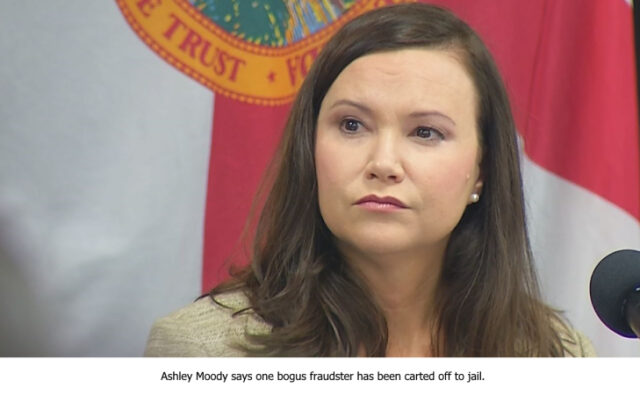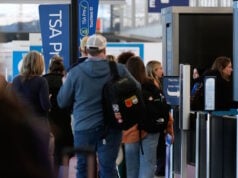
Long COVID
When the COVID-19 pandemic hit it scrambled the labor force in a variety of ways.
The pandemic pushed businesses that were able to move employees to work from home or remotely, it precipitated a surge in voluntarily quitting for higher pay known as the Great Resignation and it led to a decrease in the labor participation rate for women, as mothers often chose to leave work to care for children during lockdowns.

A report from Florida TaxWatch released Thursday shows those trends remain in effect despite the subsiding of COVID-19 and the public health protection measures used to combat its spread.
“Florida’s economy has experienced a strong rebound and significant growth over the last few years, thanks, in large part, to leadership’s strategic and forward-thinking response to the pandemic,” TaxWatch President and CEO Dominic Calabro said in a released statement.
“As noted in this report, however, the state has witnessed drastic changes to the dynamic of its workforce, presenting new opportunities, like normalizing remote work, as well as challenges, such as securing women’s place in the workforce. And today, in contrast to record low unemployment levels, Floridians are still quitting their jobs at considerably high rates — a trend impacting the leisure and hospitality industry in particular — which indicates the ‘Great Resignation’ is far from over and employees will continue to have the upper hand over employers.”
The report shows 38% of employees did at least some of their work from home, 14% higher than in 2019. And while Florida is an attractive state for those who can work remotely, the trend also presents challenges to Florida, the report states, because firms that aren’t tied to a physical location could opt to leave the state.
The quit rate remains high in the US, at 3% in June, but the “Great Resignation” is more pronounced in Florida, which had a 3.6% quit rate that month, about 338,000 workers. The report singles out low pay as a major contributor to the trend, with Florida’s leisure and hospitality industry playing a key factor in the state’s quit rate.
___
Coming up, the usual assortment of news, intel and observations from the week that was in Florida’s capital city by Peter Schorsch, Drew Wilson, Renzo Downey, Aimee Sachs, Christine Jordan Sexton and the staff of Florida Politics.
But first …
Take 5
The “Takeaway 5” — the Top 5 stories from the week that was:
Primary Election settles General Election lineup — U.S. Rep. Charlie Crist will now face Gov. Ron DeSantis in November after holding off a challenge from Agriculture Commissioner Nikki Fried. While he wasn’t on the ballot, DeSantis also proved his influence over school boards, where 25 of his 30 endorsees were elected or head to a runoff. Eight also managed to unseat incumbents. State Rep. Anthony Sabatini lost his congressional bid to Cory Mills, and Maxwell Frost looks primed to be the nation’s first Gen Z Congressman. State Sen. Gary Farmer faces a runoff for Circuit Judge, and Tallahassee Mayor John Dailey survived for a runoff against County Commissioner Kristin Dozier, who received more votes than the incumbent. State Reps. Webster Barnaby and Elizabeth Fetterhoff head to a recount in House District 29, where Barnaby holds a 31-vote lead in the GOP Primary. Meanwhile, Crist is primed to name Karla Hernandez-Mats his running mate.
Cabinet approves anti-ESG rule — The Florida Cabinet is moving forward with restrictions against “woke investments.” DeSantis has made environmental, social and governance criteria (ESG) the latest front in his battle against socially conscious culture. At the latest meeting of the Florida Cabinet, held on the day of the Primary Election, Cabinet members approved rules for the State Board of Administration (SBA). The rules require the SBA to make investment decisions solely on economic factors and prohibit the agency from sacrificing investment returns or taking additional risks. Another rule requires the SBA to review voting practices of the pension plan. Meanwhile, Chief Financial Jimmy Patronis wants the state to look into ESG-type influence in the insurance industry.
DeSantis cuts tolls for commuters — Florida commuters who frequently hit tolls will receive a discount at the end of each month, starting Sept. 1. DeSantis unveiled the SunPass Savings Program at an event in Orlando. He said it would save 400,000 drivers $40 million over the course of the six months it’s in effect. SunPass holders and other Florida residents with toll transponders could receive up to a 25% discount if they travel through enough tolls. “This is small but important savings, and when you look at everything else we’re doing, this adds up to give people some breathing room because inflation is costing people thousands of dollars a year,” DeSantis said.
Gavin Newsom pledges $100K to Crist — California Gov. Gavin Newsom is pledging $100,000 of support for Crist, with the goal of denying DeSantis a second term. “I like Charlie Crist, and I don’t like bullies,” Newsom told reporters. “If that’s the future of the damn Republican Party, this country’s in real trouble.” Within 24 hours, the DeSantis campaign had latched onto the contribution, calling Newsom “obsessed” in an email to supporters. “It seems like Newsom has done his job encouraging filth and debauchery on the streets of San Francisco that he’s now set his sights on our state.”
DeSantis suspends four Broward School Board members — DeSantis suspended four current members of the Broward County School Board for neglecting their duty, stemming from the way they managed a school construction bond. The suspensions come at the request of the grand jury investigating the massacre at Marjory Stoneman Douglas High School. The panel’s report was not released in full until last week. DeSantis appointed replacements for School Board members Patricia Good, Donna Korn, Ann Murray and Laurie Rich Levinson, immediately suspending them for “incompetence, neglect of duty and misuse of authority” relating to mismanaging the $800 million low-cost construction bond.
Brigade 2506
U.S. Sen. Marco Rubio is continuing to say thank you to Brigade 2506 more than six decades after the Bay of Pigs Invasion.
Rubio on Monday met with veterans of Brigade 2506, the CIA-backed paramilitary group of Cuban exiles who attempted to overthrow Fidel Castro’s government in April 1961. During the meeting at the Bay of Pigs Museum in Little Havana, Rubio thanked the veterans for their service and their continued leadership in fighting for a Cuba free from tyranny.

Marco Rubio says thanks to those who stormed la Bahía de Cochinos. Image via Marco Rubio campaign.
“The veterans of Brigade 2506 made the selfless sacrifice of defending their beloved homeland from the threat of Communism. Marco was honored to meet with these heroes and discuss their everlasting legacy, as well as their advocacy for a free and democratic Cuba,” Laura Ortiz, Hispanic Media Director for Marco Rubio for Senate, told Florida Politics in a statement.
Last year, Florida honored veterans and the Cuban American community for the 60th anniversary of the failed landing. Rubio, the son of Cubans who immigrated to the United States in 1956 during the Fulgencio Batista regime, was among the Cuban American lawmakers who prominently celebrated the veterans’ contributions in the ongoing struggle for a free Cuba.
In September, DeSantis awarded the Florida Medal of Freedom to former intelligence officer Félix Rodríguez, recognizing his service to the CIA and the Cuban people, including at the Bay of Pigs.
The post Takeaways from Tallahassee — The Great (Ongoing) Resignation appeared first on Florida Politics – Campaigns & Elections. Lobbying & Government..
Republished with permission [/vc_message]
Disclaimer
Artificial Intelligence Disclosure & Legal Disclaimer
AI Content Policy.
To provide our readers with timely and comprehensive coverage, South Florida Reporter uses artificial intelligence (AI) to assist in producing certain articles and visual content.
Articles: AI may be used to assist in research, structural drafting, or data analysis. All AI-assisted text is reviewed and edited by our team to ensure accuracy and adherence to our editorial standards.
Images: Any imagery generated or significantly altered by AI is clearly marked with a disclaimer or watermark to distinguish it from traditional photography or editorial illustrations.
General Disclaimer
The information contained in South Florida Reporter is for general information purposes only.
South Florida Reporter assumes no responsibility for errors or omissions in the contents of the Service. In no event shall South Florida Reporter be liable for any special, direct, indirect, consequential, or incidental damages or any damages whatsoever, whether in an action of contract, negligence or other tort, arising out of or in connection with the use of the Service or the contents of the Service.
The Company reserves the right to make additions, deletions, or modifications to the contents of the Service at any time without prior notice. The Company does not warrant that the Service is free of viruses or other harmful components.












